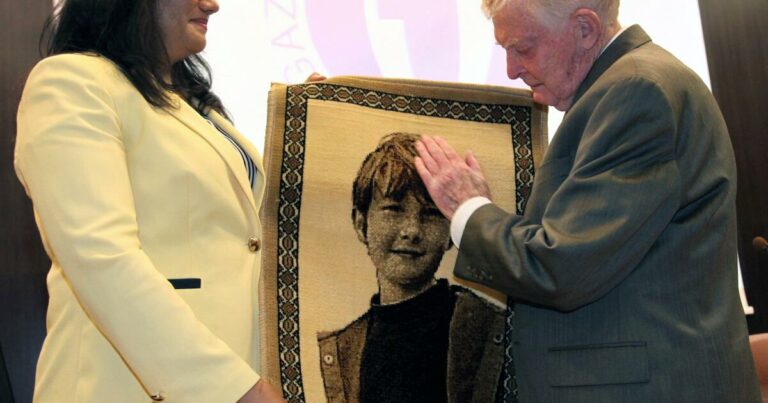
[ad_1]
For the Green family, the memory of Oct. 1, 1994 is many things at once: the date of their greatest pain and their finest hour; a day of unspeakable loss and life-giving gifts.
It is the date their 7-year-old son, Nicholas, died in an Italian hospital, two days after being shot during an attempted robbery on a family vacation from California.
Upon receiving the agonizing news, his parents, Reginald and Maggie, made an impromptu decision that would change their lives and those of countless others: they chose to donate his organs.
Seven people, five of them teenagers, received Nicholas’ corneas, kidneys, liver, heart and pancreas. The family’s story prompted a surge in interest that continues to drive new donor registrations in Italy.
This month the Greens, who now live in La Cañada Flintridge, will return to Italy for a series of public appearances and to meet with some of their son’s surviving recipients. It’s the latest chapter in a phenomenon the media long ago dubbed “the Nicholas effect,” a chain of events that has both saved lives and kept their son’s memory alive.
“Thirty years later, when I think of him, I have that feeling that: yes, it was a terrible thing to have happened. Think of all the books you didn’t read, and all the sunsets you didn’t see, and all the girls you would have fallen in love with,” said Reg Green, now 95. “But on the other side, I can always have that feeling: yes, but you did more in your seven years than most people do in all their lives to make the world a better place.”
Stunned as the Greens were by Nicholas’ death and the crime leading up to it — men who mistook their car for a jeweler’s fired at the vehicle, striking Nicholas as his sister Eleanor, then 4, slept beside him — they recalled their consent to donate his organs as an immediate and mutual decision.
At the time, Italy had one of the lowest organ donation rates in Western Europe. The Greens’ decision, along with the awful circumstances of the boy’s death, led to a swell of media attention across Italy.
The mayor of Rome had the family presented with a gold medal for their courage. A mayor in Calabria vowed to name a street after Nicholas. Plazas, schools and monuments across the country were dedicated to him.
And organ donations began to rise. The year before Nicholas’ death, 6.2 people per million in Italy donated their organs. Ten years later, as the story circulated and the numbers of parks, playgrounds and streets in Italy named after Nicholas grew, the number had tripled to nearly 20 people per million.
“They have, ultimately, dramatically increased organ donation throughout Italy,” said Tom Mone, chief external affairs officer of OneLegacy, a nonprofit that manages organ donations in Southern California. “I don’t think I’ve ever seen a single event trigger a change in cultural attitudes toward donation beyond theirs.”
Over the years, members of the family have made dozens of trips to Italy to speak on behalf of organ donation and to check in on the people whose lives were saved by their loss. The woman who received part of Nicholas’ pancreas lived for several more years after the transplant. His heart recipient, who was 15 at the time of the surgery, died in 2017.
The other five are still living. His liver recipient, who was 19 at the time of the transplant, went on to marry and have children. The Greens have met her eldest son. His name is Nicholas.
[ad_2]
Source link